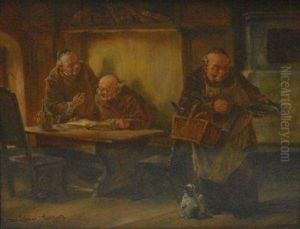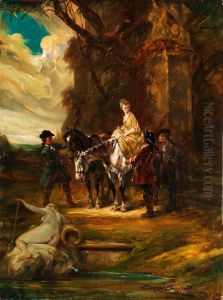Wilhelm Lehmann-Leonhard Paintings
Wilhelm Lehmann-Leonhard, born on May 4, 1882, in Puerto Cabello, Venezuela, was a significant German writer and poet whose work spanned the tumultuous periods of the early to mid-20th century, including both World Wars. Though Lehmann's name may not be as widely recognized as some of his contemporaries, his contributions to German literature, particularly poetry, have been influential. His early life, marked by the move to Germany at a young age, was foundational in shaping his perspectives and literary voice. Lehmann was a teacher by profession, a career that provided a stable backdrop to his literary pursuits.
Lehmann's literary career was characterized by a deep affinity for nature, which became a recurrent theme in his poetry and prose. His works often reflect a meticulous observation of the natural world, imbued with a sense of tranquility and a quest for understanding the human condition through the lens of nature. This thematic focus is seen as a response to the chaotic socio-political climate of his times, offering a refuge in the contemplation of the natural world's beauty and order.
Throughout the 1920s and 1930s, Lehmann's work gained recognition and was associated with the conservative revolution in German literature, though he remained a peripheral figure in political terms. His output was prolific, contributing significantly to literary journals and engaging with the intellectual circles of his time. However, the rise of the Nazi regime posed a complex period for Lehmann, as it did for many intellectuals and artists of the era. His work during this time reflected a nuanced navigation of the constraints imposed by the regime, with an inward turn that emphasized the personal and the apolitical.
After World War II, Lehmann's work entered a new phase, with a continued emphasis on nature but also a re-engagement with the human community. His poetry and essays from this period reflect a reconciliation with the changed German landscape, both literal and metaphorical. He received several awards for his literary contributions, including the prestigious Georg Büchner Prize in 1953, cementing his status as a significant figure in German literature.
Wilhelm Lehmann-Leonhard passed away on November 13, 1968, in Eckernförde, Germany. His legacy is that of a poet who sought to capture the essence of the natural world and the human spirit's resilience, offering a quiet but profound commentary on the times he lived through. His works continue to be studied for their lyrical beauty and depth of insight into the interrelation of humanity and nature.






